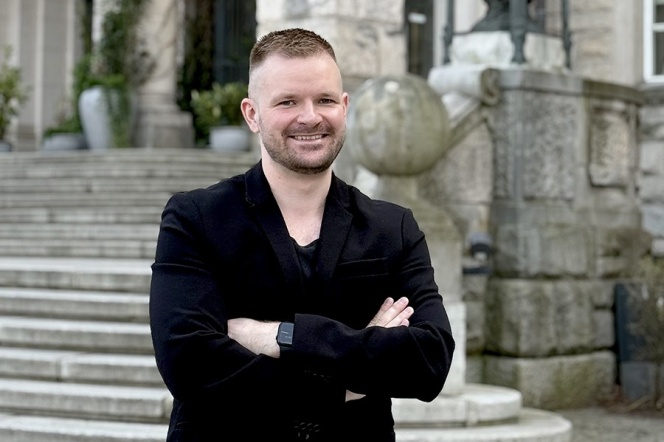Date added: 2025-04-08
Multicomponent Niobates: Ceramic Materials in Hydrogen Technologies

His doctoral thesis, entitled Structural, Thermal, and Electrical Properties of Multicomponent Rare-Earth Ortho-Niobates, was written under the supervision of Professor Maria Gazda, PhD, DSc, Eng., and its reviewers included Professor Izabela Szafraniak-Wiza, PhD, DSc, from the Poznań University of Technology, Professor Tomasz Goryczka, PhD, DSc, from the University of Silesia in Katowice, and Professor Tomasz Brylewski, PhD, DSc, Eng., from the AGH University of Science and Technology in Kraków.
Arkadiusz Dawczak's research focuses on modern ceramic materials that could be used in hydrogen-related technologies.
– Contemporary science is looking for materials capable of effectively conducting hydrogen ions (protons) at lower temperatures than the current range of 500–650°C. These materials are critical for the development of devices such as proton-conducting ceramic fuel cells, which convert hydrogen into electricity; electrolyzers with proton-conducting ceramic materials that enable the splitting of water vapor into hydrogen and oxygen; and gas sensors (e.g., hydrogen sensors) – explains the scientist. – All these devices require materials that are chemically and thermally stable and exhibit high proton conductivity.
The aim of his doctoral dissertation was to investigate whether increasing the complexity of the chemical composition in the structure of rare-earth niobates by adding different elements could enhance their properties, making them more suitable for the aforementioned applications. For this purpose, three series of single-phase compounds with complex chemical compositions were synthesized using solid-state synthesis and subsequently subjected to detailed analysis.
The results obtained indicated that all the studied compound series are thermodynamically stable and exhibit proton conductivity. Furthermore, it was found that increasing the chemical complexity in the rare-earth cation sublattice improves the solubility of acceptor dopants, leading to the formation of a higher concentration of protonic defects in humid atmospheres. This phenomenon is beneficial for proton conductivity and may contribute to improving the properties of materials used in modern electrochemical devices.
– My dissertation was part of the research project High-Entropy Oxides for Energy Conversion, funded by the National Science Centre under the OPUS 18 program – emphasizes Arkadiusz Dawczak. – The reviewers noted that the thesis constitutes a significant contribution to the development of modern ceramic materials that could be applied in renewable energy and hydrogen production technologies. The use of such materials can increase the efficiency and durability of electrochemical devices, which is crucial in the context of global energy challenges. The work was highly evaluated, and its results could provide valuable insights into the development of modern energy conversion technologies.
The researcher has been associated with Gdańsk University of Technology from the beginning of his studies, specifically with the Faculty of Applied Physics and Mathematics.
– My engineering and master's studies, especially my participation in a research project, allowed me to gain experience in modifying the properties of materials and analyzing them. This reinforced my conviction that materials engineering is the discipline in which I want to pursue my scientific career. The doctoral studies at Gdańsk University of Technology gave me the opportunity to develop through research work in modern laboratories and collaboration with foreign research centers. One of such places was the European Synchrotron Radiation Facility in Grenoble, where I conducted part of my research. An important aspect of my studies was also the opportunity to participate in scientific conferences, which enabled me to exchange experiences and present research results. I participated in seven conferences. I gave oral presentations at three, while at the others, I presented my results in poster form. My scientific output includes five articles published in international journals from the Journal Citation Reports list, of which I am the first author in two, and three others are directly related to the subject of my doctoral dissertation – summarizes Arkadiusz Dawczak.
After defending his thesis, Arkadiusz Dawczak plans to work in a research laboratory where he can apply the knowledge and experience gained during his doctoral studies. He is also considering a post-doctoral position, especially if an interesting offer appears in the field he specializes in.

